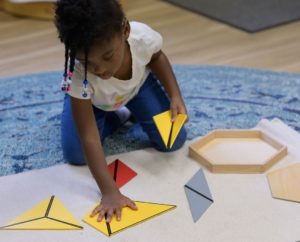Use Statements Rather Than Questions
Nix: “Where does the truck go?”
Choose: “The truck goes on the shelf”
Remember, we want the toy put away! Asking your child, “Where does the truck go?”, requires that the child be able to say the words “on the shelf” and understand, abstractly, that your question is relative and you really are asking because you want your child to put the truck away, where it belongs. “The truck goes on the shelf” is more directive and only requires the child, developmentally, to be able to comprehend your direction, which is likely!
Be 8 Seconds More Patient
Ask your question and then count the eight in your head before asking or prompting directions again. Promise. Try it once and see what happens!
Piaget, a child development theorist, developed the Cognitive Development Theory. This theory includes a stage called, the Preoperational Stage, which begins when a human (infant/toddler-aged child) starts to speak, yet, cannot think concretely and also cannot manipulate information mentally. So, the processing time to your question may be why it feels like your child is “not answering you”.
Say Fewer Words
Nix: “Please walk over here carefully and hand mommy the scissors. Those are sharp and I do not want you to get hurt. Bring them here please, be careful! Please walk.”
Choose: Say “walk here, please.” and point in front of you. Once your child is standing in front of you, say, “Scissors” and put your hand out. Once you safely have the scissors say, “we sit when we hold scissors”.
Remember, Piaget has let us know that the brain at this infant/toddler stage is not capable of understanding concepts like “sharp” or “hurt” the way adults do. We want to avoid testing the child on concepts that only parts of their brain can understand – when that part of the brain is not yet developed. Infants and toddlers hear everything but usually only remember the most recent thing said. For example, when you give a toddler a child between green or blue, 9/10 times the toddler will choose blue because it is what they remember not because it is their favorite color.
It is important to remember to choose ACTION over ATTITUDE. Yes, when they grow a bit older we will have to beg them to take the trash out and it will not matter how we ask, right? But, as the teenager stomps through the kitchen and to the dumpster – we appreciate that at least the trash got taken out! This same ideal applies to younger infants and toddlers as well – but we have more control the more we understand their developmental needs and capabilities! What strategy are you excited to implement first?



